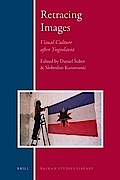Neuerscheinung: Retracing Images. Visual Culture after Yugoslavia. Herausgegeben von Daniel Šuber und Slobodan Karamanić
12. März 2012
Leiden: Brill 2012. (Balkan Studies Library, 4)
Zitation
The essays in this collection disclose cultural and political dynamics as they occurred before and in the wake of Yugoslavia's dissolution (1991-92) by analyzing visual data such as film, art, graffiti, street-art, public advertisement, memorials, and monuments. Within the vast field of Balkan Studies such visual materials have rarely been taken for important empirical evidence.
Against the still widely held presumption that the cultural production of allegedly "totalitarian" states such as Yugoslavia can be neglected as they were penetrated by state ideology, the contributions offer a corrective image of the complex ideological dynamics and discoursive potentials in various artistic and cultural fields. Phenomena such as "Titostalgia", nationalist mobilization, nation-branding, rewriting of history, inventing of traditions, and symbolic violence that have surfaced in recent years are interpreted in the light of Yugoslavia's legacy. (Verlag)
Mi Beiträgen von: Zoran Terzić, Elissa Helms, Miklavz Komelj, Nebojša Jovanović, Isabel Ströhle, Sezgin Boynik, Gregor Bulc, Davor Beganović, Robert Alagjozovski, Gal Kirn, Mitja Velikonja, Daniel Šuber, and Slobodan Karamanić.
Dr. Daniel Šuber ist Oberassistent am Soziologischen Seminar der Universität Luzern. Slobodan Karamanić promoviert in Anthropologie des Alltagslebens an der Ljubljana Graduate School of the Humanities. Beide waren wissenschaftliche Mitarbeiter am Exzellenzcluster „Kulturelle Grundlagen von Integration“ im Forschungsprojekt „Kultur der Wunde. Zur visuellen Veralltäglichung des kulturellen Traumas in Serbien“.
